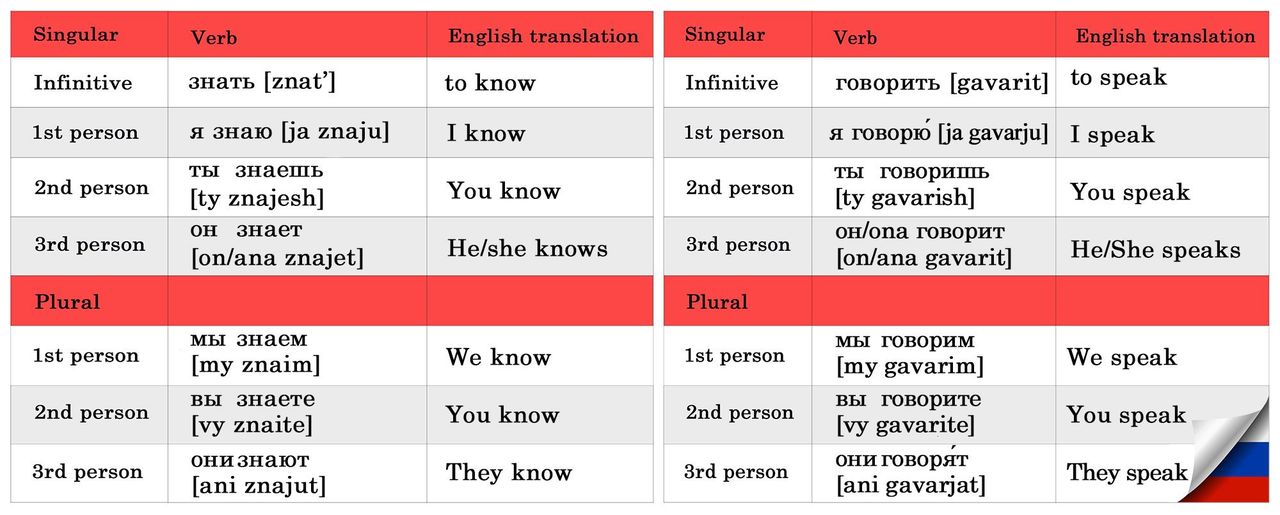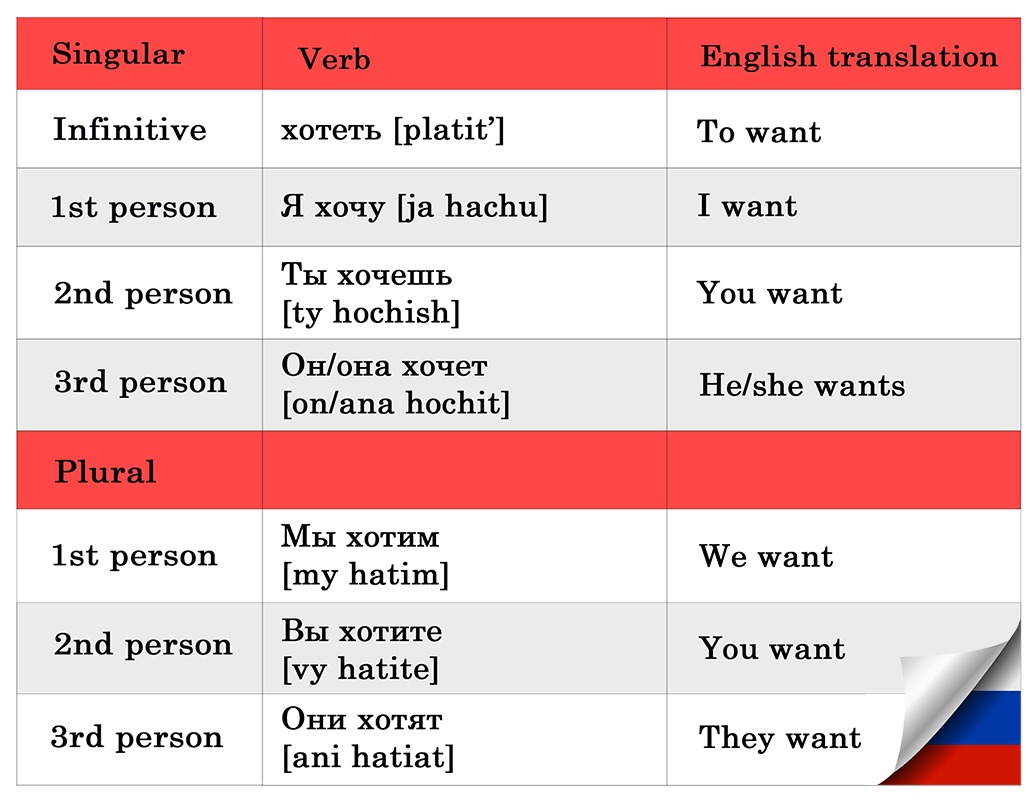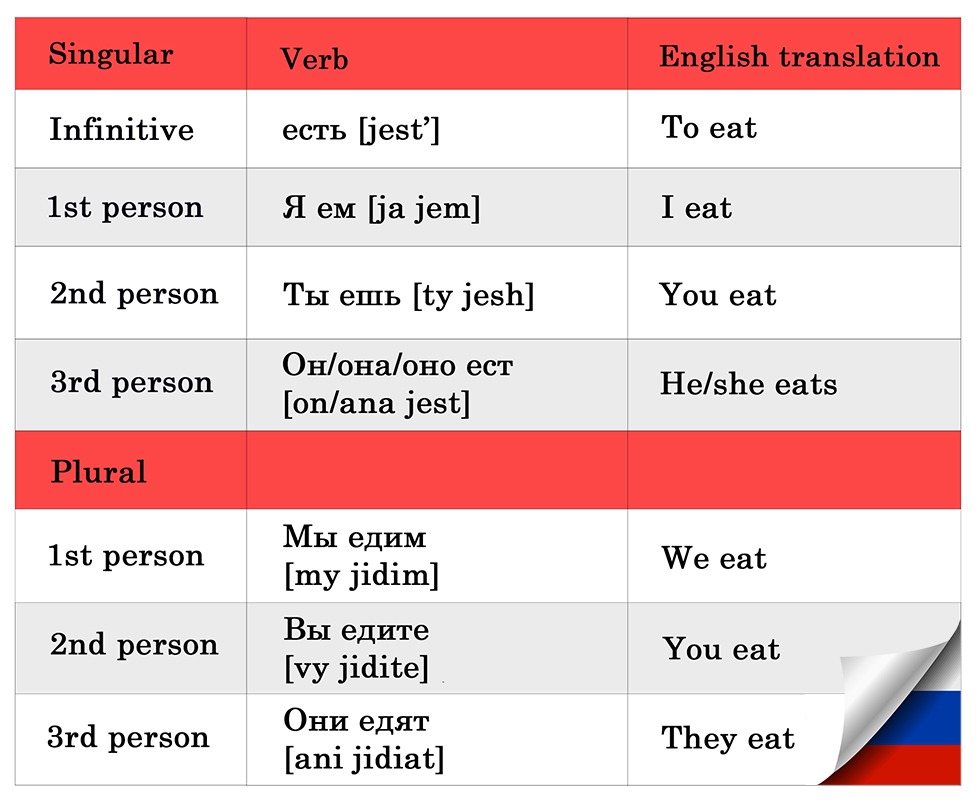Tackle Russian Verb Conjugations Today
If you are familiar with Russian grammar, you’ll probably assume that learning Russian verb conjugations will be a horror show.
You might already know that conjugation presupposes change of a verb depending on a subject and a number. In Russian, apart from the infinitive, there are six forms of a verb that are defined by an agent. Take a deep breathe, because we are going to end your fear of verb conjugation by setting out the rules in an easy to understand way… we promise!
In English, there is a very simple conjugation system. Here’s how it works:
1) the verb ‘to be’
I am reading We are reading
You are reading You are reading
He/she is reading They are reading

2) verbs in the present tense third person singular:
He/she reads a book every day as opposed to I/you/we/they read a book every day.
As mentioned above, unlike in English, the Russian system of conjugation is far more complex. Let’s have a look at the most frequent verb suffixes for all verb forms in the present tense.
How to conjugate verbs in Russian
There are two conjugations in Russian: the first and the second.
The first conjugation can also be called an ‘e-conjugation’ because it often contains a letter ‘e’ in the suffix of the infinitive, the verb forms of the 2nd and the 3rd person singular as well as of the 1st, the 2nd and the 3rd person plural.
The second conjugation is called an ‘i-conjugation’ because it has the Russian letter ‘и’ in the suffixes of the respective verb forms.


However, because of the tricky pronunciation of the unstressed vowels in Russian, you cannot be sure which vowel to place in a suffix – ‘е’ or ‘и’.
To make things more complicated, you can only be certain how to spell a word correctly after you define the conjugation of a given verb. So, how do we distinguish which verbs belong to which conjugation considering that not every infinitive contains a ‘е’ or a ‘и’ in the suffix in the first place?

Verbs that make up the first conjugation
1) Whose infinitives end in –чь:
печь [piech] – to bake
стричь [stich] – to cut (hair, nails), trim, shear
2) Whose infinitives end in –ти:
идти [iti] – to go
везти [visti] – to carry, drive (somebody)
вести [visti] – to lead, navigate
3) Whose infinitives end in – ать, ять*:
стоять [stajat’] – to stand
писать [pisat’] – to write
читать [chitat’] – to read
*There are 4 verbs ending in –ать that belong to the 2nd conjugation
4) Whose infinitives end in –еть**:
болеть [balet’] – to hurt, to be ill
петь [piet’] – to sing
сидеть [sidet’] – to sit
** There are 7 infinitives ending in – еть that belong to the 2nd conjugation (see further below)
5) Whose infinitives end in – ыть:
мыть [myt’] – to wash
рыть [ryt’] – to dig
плыть [plyt’] – to swim
6) Whose infinitives end in – оть:
колоть [kalot’]- to sting, stab
молоть [malot’] – to grind, mill
Verbs that belong to the 2nd conjugation
1) Whose infinitives end in –ить*, i.e.:
варить [varit’] – to boil, to cook
винить [vinit’] – to blame
любить [luibit’] – to love
*However, there are the following exceptions to the rule:
брить [brit’] – to shave
стелить [stilit] – to lay, to make (bed)
ошибиться [ashibitsa] – to make a mistake
2) The following 7 verbs whose infinitives end in –еть:
обидеть [abidit’] –to hurt, insult, offend
терпеть [tirpet’] – to suffer, endure
зависеть [zavisit’] – to depend
вертеть [virtet’] – to spin, turn, twist
видеть [vidit’] – to see
смотреть [smatret’] – to look
ненавидеть [nenavidit’] – to hate
гореть [garet’] – to burn
3) The following 4 verbs with the infinitives ending in –ать:
слышать [slyshat’] – to hear
гнать [gnat’] – to chase, race
дышать [dyshat’] – to breathe
держать [derzhat’] – to hold
Things to remember about verb conjugation in Russian
As you might have noticed, unlike in English, the Russian conjugation system is very intricate because:

1) All the verbs are grouped into 2 conjugations depending on their endings, of which there are quite a few to memorize.
2) Frequently, there is an interchange of sounds that you have to remember because it can only be explained by some ancient phonetic laws, i.e. the letter ‘т’ in the infinitive is substituted with ‘ч’ in some word forms, ‘с’ changes to ‘ш’ and ‘ж’ changes to ‘г’ respectively :

3) There are a lot of exceptions to the rules.
One of the examples is the verb ‘хотеть’ [hatet’] – ‘to want’ which is conjugated irregularly. In the singular, it’s conjugated like a verb of the 1st conjugation and in the plural – like a verb of the second conjugation:

Another common verb whose conjugation you have to remember is ‘есть’ [jest’] – to eat

Although these endings might seem to be overwhelming, once you have learned a couple of dozens of verbs, you will notice that all of them follow only a few conjugational patterns. Therefore, take a step at a time, memorize all of the forms of the most common verbs, and you will be able to conjugate Russian verbs in no time at all!
Check out LingQ today to discover the best way to learn Russian from content you love!
Enjoyed this post? Check out polyglot and LingQ cofounder Steve Kaufmann’s blog post for some tips on learning Russian!
***
Ievgeniia Logvinenko holds a Master’s degree in English philology and is passionate about languages. In addition to English, she speaks Russian, Ukrainian, Polish, German and basic French.
